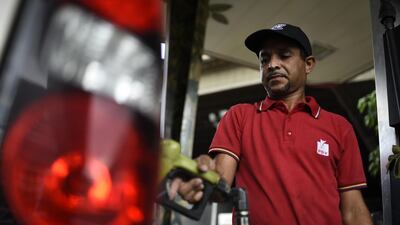With the US issuing new sanctions against Venezuela’s oil industry this week, President Nicolas Maduro looks increasingly less likely to survive. How could a new government leverage the country’s vast oil resources to alleviate the humanitarian and economic crisis?
Although the US, Russia and Saudi Arabia are the world’s largest oil producers, Venezuela actually has the largest reserves – 303 billion barrels of recoverable oil, according to the Organization of Petroleum Exporting Countries (Opec). Even though some of this oil is going to be difficult and expensive to get out of the ground, Venezuela should be producing much more oil than the current 1.17 million barrels per day. Two decades ago, it briefly produced almost 3.5 million barrels per day.
Venezuela’s difficulties began in the early 2000s, when former President Hugo Chavez gutted the national oil company, PDVSA. Mr Chavez fired managers, executives and engineers to exercise political control over what had been a professionally run, independent company. Many skilled experts left the country to work elsewhere, particularly Canada.
In Mr Chavez’s socialist economy, agriculture, manufacturing, fuel, electricity, medicine and food all became centrally managed. As oil prices rose into the triple digits in the late 2000s and again in the early 2010s, the government deliberately neglected - and in some cases actively dismantled - many of Venezuela’s other successful industries.
At first, high oil prices masked the deterioration of what had once been a vibrant and diverse economy. However, after oil prices began to collapse in 2014 - bottoming out in January 2016 at $29 per barrel - Venezuela’s widespread economic weaknesses were revealed. It was only a matter of time before people started to starve. This was compounded in that Venezuela’s oil is particularly expensive to produce and must be mixed with diluents before being shipped abroad. At times, Venezuela has actually lost money on exports.
As the economic crisis spread, the oil industry began to crumble, with workers going unpaid and drilling and refining operations falling into disrepair. Under Opec’s current quotas, Venezuela may produce as much as 1.97 million barrels per day, but it is simply incapable of doing so. Also, much of the profit it does earn goes to pay interest on debt owned by Chinese and Russian interests.
The question now is whether, should the opposition wrest control from Mr Maduro and his allies, it can turn the nation’s oil into an economic advantage.
The quickest way for Venezuela to put its oil to work for the benefit of the people is to change its Chavez-era hydrocarbon law and permit companies other than PDVSA to develop its reserves. Then it would have to negotiate concession agreements with private international oil companies, being careful to ensure these deals are in its own interests but also attractive to suitors. Iran’s mistakes from a few years ago are an example of what to avoid: burdensome conditions that scared away foreign oil companies and the investment needed to reinvigorate the oil industry. For example, Tehran insisted that private foreign companies share their technology with Iran and that all equipment brought into the country become its property. It demanded that oil fields revert back to Iranian control after production began, with companies receiving a predetermined amount of money regardless of how much Iran makes from exports.
Venezuela has to be open to negotiations, led by professional oilmen rather than the current rotating group of cronies and military leaders.
Any investment agreements should require an upfront payment, because Venezuela needs cash to ease the humanitarian crisis and pay off foreign debt. Equally important, however, the concessions should include a reasonable structure of long-term rents, fees and profit-sharing - Venezuela cannot mortgage its future for the sake of the present. A timely start to production should be top priority - along the lines of the model followed by some of the gas development in Iraqi Kurdistan - so that some oil gets to the market as soon as possible and larger volumes come later. Contracts should not permit companies to sit on the assets until conditions are optimal for them.
Venezuela still has an experienced and capable domestic oil workforce. Any concession agreements should require foreign companies to employ these people both in the oil fields and downstream in refineries, shipping and the like. Ideally, jobs would become sufficiently plentiful and high-paying to entice expatriates to return.
One idea would be to create subsidiaries of PDVSA. Each would work a certain region of the oil reserves or downstream operations, and would seek separate investment from other countries or financial institutions. They could offer return to investors in the form of increased share value, dividends or rights to discounted oil and oil products.
But none of these steps will be possible unless any new government can find a way to renegotiate its vast foreign debts. PDVSA is struggling to pay the interest on debt owned by Rosneft, the Russian oil conglomerate. The collateral on that debt consists of a 49.9 per cent share of Citgo, the American-based gas refiner and marketer, which PDVSA does not want to lose without compensation. It wouldn’t be in U.S. interests, either, for the Russians to take ownership of those shares, so a new administration in Caracas would be wise to approach Washington to facilitate the purchase of the debt with better terms by a US investor.
Oil can jumpstart Venezuela’s economy, but not become Venezuela’s economy. A truly prosperous future depends on using abundant petroleum to restore the diverse economy that once made Venezuela one of Latin America’s true bright spots.
Bloomberg

